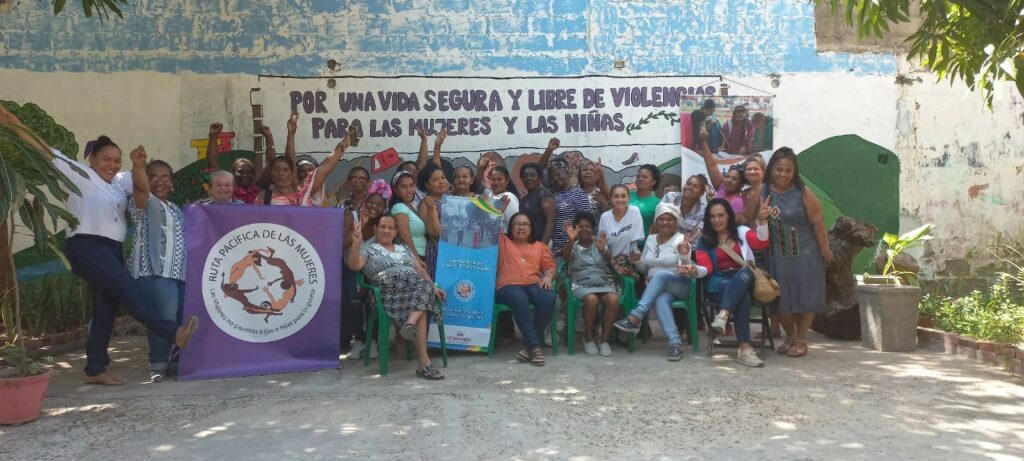First National Action Plan against the armed conflict in Colombia: What impact can it have on the lives of women and girls?
By Katharina Wagner, International Civil Service Peacekeeper of the Ruta Pacifica de las Mujeres (Women’s Pacific Route) in Colombia and Ester Pinheiro, Communications Officer – Spanish, Equal Measures 2030
Armed conflicts in Colombia have a direct impact on women’s lives, through forced displacement and other violations, such as the right to land and work, to culture, and even the violation of their bodies. These forms of direct violence appear together with threats and harassment as forms of control over territory and the lives and organizational initiatives of women.
The impact of conflicts around the world affecting women is similar to that of Colombia, and that is why, on October 30, 2000, the United Nations Security Council adopted the historic Resolution 1325 on Women, Peace, and Security. It recognizes the differentiated impact of armed conflicts on women and girls, the importance of their protection and the need for their participation in peace processes.
Based on this resolution, in order to contribute to the official construction of the first National Action Plan for 1325 (PAN 1325), the feminist peace movement Ruta Pacifica de las Mujeres in Colombia has been working for more than a year with 13 other national women’s organizations with a presence in different parts of the country within the framework of the Alliance 1325: Women, Peace, and Security.
These organizations seek to influence the Colombian government to commit to this Action Plan. “We have advanced quite well, because the new government listens to us through the Presidential Counselor’s Office for Women’s Equity and the Foreign Ministry, and the dialogue with other women’s organizations has been important for the process of building a NAP 1325. The current Deputy Foreign Minister, Laura Gil, commits to the Women, Peace, and Security Agenda. She pushed the current government to commit to it,” says Katharina Wagner, International Civil Service Peacekeeper of the Ruta Pacifica de las Mujeres.
What impact will the Plan have on the lives of women and girls in Colombia?
In Colombia, women’s access to justice is limited, and the country scores poorly in perceptions of openness and legitimacy of the state, according to the Equal Measures 2030’s 2022 SDG Gender Index. It is therefore valuable to consider the importance of resolution 1325, which recognizes for the first time the relevance of women’s participation in peace negotiations, humanitarian assistance, peacekeeping and peacebuilding operations.
For La Ruta Pacífica de las Mujeres, this Plan is necessary for Resolution 1325 to materialize and for public policies to be specific, with an allocated budget and clear responsibilities so that the four pillars of the Resolution are fully implemented in the lives of women.
“As long as there is no specific policy and budget this is nothing more than a paper document. This Plan could mean that women are guaranteed effective participation in all peace processes and conflict prevention and that they are also protected against all forms of violence, especially gender-based and sexual violence. In addition, this Plan is important for measures to be taken for female victims of the conflict with a view to their recovery and for peace signatories to be able to reintegrate into social life”.
Considering that women’s perception of security in Colombia is almost 12 points lower than the global average, the National Action Plan 1325 is also necessary to have an impact on conflict and issues of violence. “This Plan has a broader vision of violence because women and women’s organizations have pointed out that violence against women is exacerbated in the framework of the armed conflict. This affects private life because it reinforces the historical discriminations they have suffered, and therefore this construction of the Plan should be supported”, says Katharina Wagner.
Women in the Action Plan: how are their voices being heard?

Photo of the 1325 Workshop in Cartagena with women from Bolivar and Sucre. Credits: La Ruta Pacifica.
To listen to women from different regions, the Alliance is conducting workshops in different territories of Colombia to gather input from the voices of women, their needs, and priorities on peace and security issues. According to UN Women, more than one thousand diverse women have been heard: indigenous, black, Afro-descendant, LGBTI, etc.
Alliance 1325 will use the women’s contributions for the construction of input documents that will be delivered to the Government. Some of the concrete actions proposed by women in this regard are:
- Comprehensive implementation of the Final Peace Agreement, specifically of the gender measures.
- Efficient protection measures for women defenders and leaders that take into account the needs of women and the particularities of the territories.
- Differential and comprehensive care for female victims of violence that does not re-victimize them.
- Guarantee the effective participation of women in decision-making spaces on security and peace issues. Therefore, there will be measures to promote the participation of women in political decision-making spaces, for example, in the legislative branch.
- Sensitization, education, and training on gender issues and women’s rights for all officials.
- Police training in conflict resolution respecting human rights and based on dialogue.
Although the organizations are assisting the Government in the formulation of the Plan, contributing the experiences of women from different territories, the responsibility for this Plan lies with the Colombian State. This process completes in September 2023, and presented at the 78th Session of the United Nations General Assembly. Once the plan is finalized, La Ruta and Alliance 1325 will be closely monitoring the implementation of the plan to ensure that it leads to real change in the lives of women and a lasting peace in Colombia.
*Originally written in Spanish, as such some links may lead to Spanish articles.



